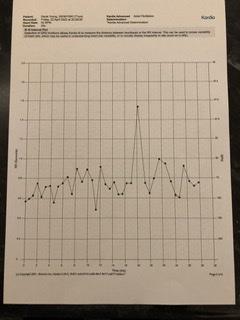Hi,
I’m hoping someone can shed some light on the following.
Looking through the previous ECG’s I’ve taken with my Kardia I found by accident that if I download one of these there is a sheet that gives a graphical view of my heart rate over the 30 seconds.
I then found on many of my past ECG’s that for example my heart rate is relatively constant between a band of say 65 and 100 for the 30 seconds but with one beat dropping from say 80 to 40 and then back up to 80 over 2 seconds.
My question is what effect that odd beat would have, would it make one dizzy momentarily.
I’ve attached a photo (hopefully)
